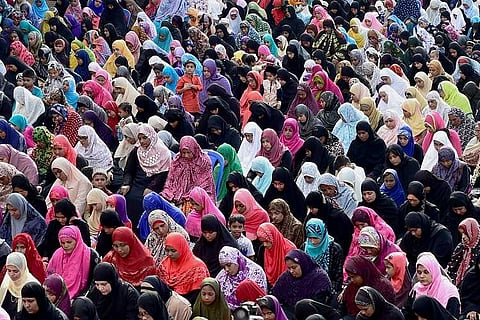

Declaring the practice of triple talaq unconstitutional, the Supreme Court on Monday told the government to enact a legislation on the matter.
The SC barred instant triple talaq until the time the Parliament made a law on the issue, reports said. The court passed a temporary injunction against the practice.
The court also urged all parties to set aside their politics and come to a decision on the issue. It also expressed the hope that the legislature will take account of Muslim law when making the new law.
The historic case was heard by Chief Justice Jagdish Singh Khehar, and Justices Kurian Joseph, Rohinton Fali Nariman, Uday Umesh Lalit and Justice S Abdul Nazeer – a five-judge bench from different faiths including Hinduism, Christianity, Islam, Sikhism and Zoroastrianism.
Thee bench delivered a majority ruling (3:2) with Justice Rohinton Nariman, Justice Kurien Joseph and Justice UU Lalit striking down triple talaq as unconstitutional.
CJI JS Khehar and Justice S Abdul Nazeer were of the opinion that triple talaq cannot be declared illegal.
"It is a disapproved form of divorce. Even Hanafi law says triple talaq is sinful. 1937 Act recognizes triple talaq and therefore does not violate Article 13...Triple Talaq won’t fall within confines of Article 13(1)...It is not possible for court to fold his hands when petitioners come to court. Court has to declare whether practice is legal or not," Justice Rohinton Fali Nariman said.
Background
The practice of triple talaq has been in practice for many centuries, but is illegal in many Islamic countries.
Those opposed to the contentious practice say that the arbitrary divorce is discriminatory towards women and goes against their fundamental rights.
The hearing, spread over five days from May 12 to May 18, was rooted in the apex court's October 16, 2015 order directing the separate listing of a PIL addressing the question of the rights of Muslim women.
The bench heard seven petitions, including five filed by Muslim women who challenged the practice.
At the outset of the hearing, the court had made it clear that it would not examine the validity of anything that formed an intrinsic part of Islamic religious practices – thereby ousting any submissions on polygamy.
The court had framed three questions to be addressed by all the parties – whether triple talaq was fundamental to Islam, whether it was sacrosanct to Islam and whether the practice was an enforceable fundamental right.
In the course of the hearing, the AIMPLB issued an advisory, telling qazis to give an option to Muslim women to opt out of instant triple talaq before giving consent for 'nikah'.
In their affidavit before the court, they said that qazis all over the country have been instructed to record in the Nikahnama, that the bride has opted out of triple talaq in one sitting.
Senior counsel Salman Khurshid, who was assisting the court in the matter, had said that "What was sinful in theology, can't be good in law. It (triple talaq) is not only not an essential part of Muslim religion, it is not a part of religion at all. On the contrary, it is depreciated by Islam," he said.
However, the court was not appreciative of the government position that the top court should first pronounce on the constitutional validity of the triple talaq and other forms of talaq, and the government would only then bring in a law.
"We may or may not (decide the issue), but you do," Chief Justice Khehar had said when the Central government told the court that it should intervene in a situation where there is no legislation.
While founding its case on gender equality, the government had linked the issue of triple talaq with that of constitutional morality, but the court termed its position a "whitewash".
As the Centre sought to flag the issue of gender equality of Muslim women vis-a-vis women in other religions and in Islamic countries, the AIMPLB asked it to bring a law taking recourse to Article 25 (2)(b) of the Constitution that permits enactment of law invoking social reforms.
However, AIMPLB had cautioned the Constitution bench that "testing the validity of customs and practices was a slippery slope".
With IANS inputs